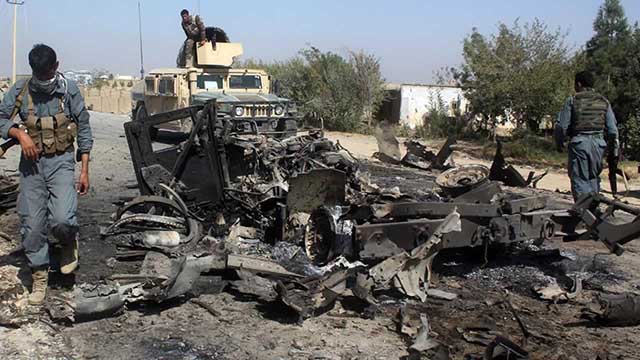Soon after Taliban confirmed Mullah Omar’s death, Afghanistan’s National Unity Government (NUG) embarked on a publicity war against the group claiming that Omar’s death can bitterly divide and therefore weaken the already debilitated terrorist group. It took the Taliban until late July to overcome the rancorous wrangling and power struggle in the vacuum of leadership and to name Mullah Akhtar Mohammad Mansur, Taliban regime’s chief of aviation and the groups second-in-command since they were driven into exile in Pakistan in 2001, as Omar’s successor.
To consolidate his position, and to fight back in the publicity front, Mansur began to orchestrate and carry out some small-scale skirmishes, which gradually grew to become a vital concern for the northerners (and for the ex-Northern Alliance). A little more than a month ago, First Vice-President, General Dostum, launched a clearing operation to fend the Taliban off the Northern Provinces, namely Jawzjan, Faryab and Sar-e-Pul. General returned back to Kabul with high confidence and hope rejoicing his victory. All that was mistakenly simplistic and surprisingly short-lived, however.
Nearly a month after Dostum’s clearing operation, on September 28, the Taliban fighters raided Kunduz from three directions and captured a capital-province for the first time since 2001 without a considerable resistance. Afghan National Army’s operation to recapture Kunduz failed to launch until Wednesday. Backed by Afghan Commandos & Special Forces and US troops air strike, the ANA seized parts of Kunduz city on Thursday but soon, the city again fell to the Taliban. Taliban’s hit-and-run attacks and counterattacks continued for 13 days until the city was completely cleared on October 11.
Outraged by the attack and the Taliban’s war crimes in Kunduz, Afghan citizens and media outlets published harsh polemics criticizing central government’s inability and mismanagement in keeping security and in protecting its citizens. Some MPs and high government officials mouthed a “fifth column” responsible for the fall of Kunduz while some others went even further blaming Ghani and his cohorts for intentional remiss in this regard and accusing him and his cohorts for playing this game for hegemonic ends. The case was further compounded with two Pakistani generals found dead in the counteroffensive. With that, the Kunduz war got a mysterious but unsurprising aspect.
Since in office, Ghani has had five trips to Pakistan to discuss security issues and to urge Islamabad for collaboration and cooperation in fighting the Taliban.Apparently, and to everyone’s dismay, all the endeavors to gain Pakistan’s cooperation in fighting the Taliban have simply and ridiculously ended up aborted.
On the other hand, Taliban’s this time attack is distinctly different than their previous ones, regarding both the more calculated and relatively successful tactics they employed and the outrageously extensive brutalities and human rights abuses they committed. They had positioned themselves in civilian homes days before they launched the attack to hinder government’s counteroffensive by utilizing civilians as a human shield. Besides, they committed shocking persecution, raped hundreds of women and girls, and killed dozens indiscriminately. Even, they allegedly had a slaughterhouse in the outskirts of Kunduz where they tortured to death many of the captives.
What the National Unity Government should take serious is the bitter fact that the Taliban are way stronger than to be ignored or denigrated. As announced recently by the U.N., “Taliban’s reach is widest since 2001” and that is simply alarming. Since 2005-6, taking full advantage of the absence of a political will to fight them, Taliban have restructured and have increasingly gained power to an extent that can capture a key province with only a limited number of fighters and within less than a few days.
Taking this into account, the National Unity Government should rectify its simplistic and erroneous picture of the Taliban and should go beyond its deceitful publicity to ensure that the other provinces don’t fall prey to, or fall to, the Taliban. Frankly, what Afghanistan lacks political will in fighting the Taliban.
In order to prevent more of its districts and provinces from falling to the Taliban, National Unity Government should reconsider all its strategy in this regard keeping in mind that the Taliban’s white flag can be raised in the capital city of any of the 34 provinces should they continue lagging on the current path.

